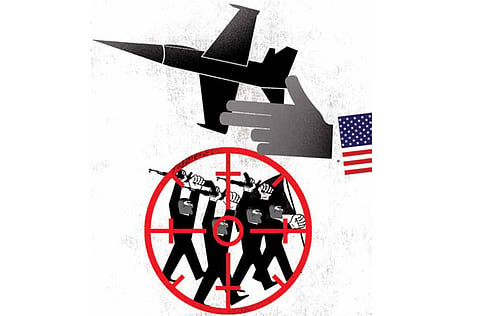War on Isil: The coalition of the unwilling
Lessons learned from the Iraq war have given some of reason for trepidation

US President Barack Obama finally had enough. Amidst rising criticism of his lukewarm response to global hotspots like Syria, Islamic State of Iraq and the Levant (Isil) and Ukraine, the president took to the airwaves last week to declare that enough was enough. He singled out Isil as his target. The call had been preceded by phone calls to US allies in the region, including Saudi King Abdullah Bin Abdul Aziz.
In a forceful address to the nation, Obama emphasised that “I have made it clear that we will hunt down terrorists who threaten our country, wherever they are. That means I will not hesitate to take action against Isil in Syria, as well as Iraq. This is a core principle of my presidency: If you threaten America, you will find no safe haven.”
The strategy of dealing with Isil was ironed out with members of his war cabinet, which included Vice-President Joe Biden, Secretary of Defence Chuck Hagel, leaders of the military and the chiefs of US intelligence agencies. The US will hunt down Isil in Syria from the air while a coalition of nations will provide logistical support to anti-Isil forces by training and equipping them for the battles ahead. As leader of the ‘broad coalition’, the US will spearhead the attack, but will not commit ground troops.
His speech was followed by intensified efforts by the US Secretary of State, John Kerry, who was in the region. Kerry had been holding talks with Iraq’s new leadership in the same week on their role in a long-awaited strategy against Isil. During his talks, Kerry stated that neither the US nor the rest of the world “will stand by and watch Isil spread its evil”.
A day later, he was in Saudi Arabia’s port city of Jeddah where he met the foreign ministers of 11 countries, including the Gulf Cooperation Council (GCC) states. Ten of the Arab states in attendance agreed to support the US in the war against Isil’s terrorism, forming a regional collective group to support the US as it seeks to garner support for an international coalition, much in the same manner that George Bush Sr did back in 1990 in the months preceding Desert Storm. The ten states agreed to do their share in the comprehensive fight.
This included joining the US in their “shared commitment to stand united against the threat posed by all terrorism, including the Isil, and joining in the many aspects of a coordinated military campaign against Isil extremists. The fight will include “stopping the flow of foreign fighters through neighbouring countries, countering financing of Isil and other violent extremists, repudiating their hateful ideology, ending impunity and bringing perpetrators to justice”. The coalition will also contribute “to humanitarian relief efforts, assisting with the reconstruction and rehabilitation of communities brutalised by Isil, supporting states that face the most acute Isil threat”.
The Saudis committed to providing camps and support for the training of moderate Syrian rebels battling the extremists and President Bashar Al Assad’s government in Damascus. The Turks who were present at the meeting later declared that they would not be taking part in the battle.
Iran, which has been backing militias fighting Isil, did not take part. Kerry said “Iran is taking its own actions”.
The Iranians, however, responded with serious doubts on the soundness of the coalition. In a statement issued by its Foreign Ministry, Iran said “the so-called international coalition is shrouded in serious ambiguities and there are severe misgivings about its determination to sincerely fight the root causes of terrorism”.
Germany and Britain also went on record stating their opposition to US calls for air strikes against Isil in Syria. The German Foreign Minister, Frank-Walter Steinmeier, in a news conference in Berlin said that Germany had not been asked to take part in the airstrikes and would not be participating.
“We have not been asked to do so and neither will we do so,” Steinmeier said. His British counterpart, Philip Hammond, added that while Britain “supports entirely the US approach of developing an international coalition” against Isil, let me be clear: Britain will not be taking part in any airstrikes in Syria. We have already had that discussion in our parliament last year and we won’t be revisiting that position.”
The Russians joined in the coalition of the unwilling by stating adamantly that strikes against Islamist militants in Syria without a United Nations Security Council mandate would be an act of aggression. Foreign Ministry spokesman Alexander Lukashevich charged that “the US president has spoken directly about the possibility of strikes by the US armed forces against Isil positions in Syria without the consent of the legitimate government. This step, in the absence of a UN Security Council decision, will be an act of aggression, a gross violation of international law.”
So there you have it. While the Arab states have in principle agreed to confront the growing menace of Isil extremists, there remains concern over the cohesiveness of an international coalition. Perhaps, the lessons learned from the Iraq war have given some of them reason for such trepidation.
Tariq A. Al Maeena is a Saudi sociopolitical commentator. He lives in Jeddah, Saudi Arabia. You can follow him on Twitter at www.twitter.com/@talmaeena


